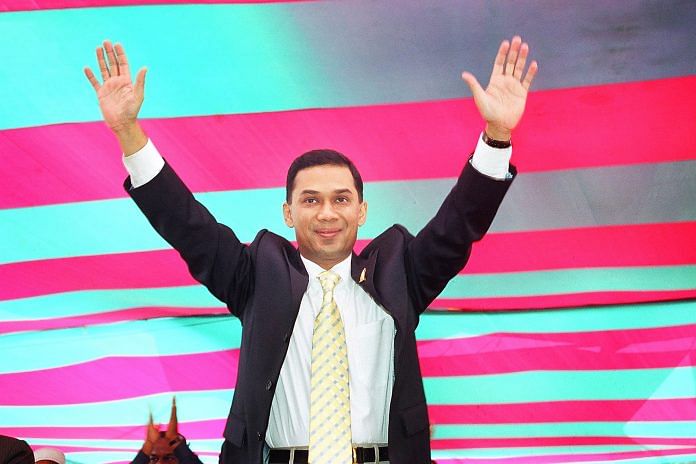BNP is likely to fight parliamentary election in Bangladesh without the kin of Ziaur Rahman leading the campaign.
The conviction of Tarique Rahman, the acting chairperson of Bangladesh’s main opposition Bangladesh Nationalist Party and son of former Prime Minister Khaleda Zia, in the grenade attack case puts future leadership of the BNP in peril.
Tarique Rahman along with 18 others have been sentenced to life imprisonment while another 19 have been given death sentence, including two former ministers in the previous BNP government (2001-2006), for conspiring with dreaded militant organisation Harkat-ul Jihad-al-Islami Bangladesh (Huji-B) in a grenade attack on Sheikh Hasina, who was the opposition leader then. The 21 August grenade attack, as it is called, was one of the biggest acts of militancy in the country and was executed by Huji-B in 2004. It killed around 20 Awami League leaders and activists and injured several hundred at a rally in Dhaka.
BNP, the arch rival of the ruling Awami League, is a dominant political force in the multi-party political system of Bangladesh. The party has the distinction of alternating power with the Awami League after democracy was reintroduced in 1991. But a leadership crisis in the BNP began after its chairperson Khaleda Zia was convicted in February in a case of misappropriation of funds in an orphanage named after her late husband, military dictator General Ziaur Rahman. Currently, Begum Zia is serving a five-year jail sentence.
Also read: Delhi supports ‘dictator’ Sheikh Hasina despite Khaleda Zia’s entreaties
According to the provisions in the Bangladesh Constitution, Begum Zia runs the risk ofbecoming ineligible to fight the election unless she gets some relief from the higher court. According to Article 66 (2) (d) of Bangladesh Constitution, a person shall be disqualified in the election to be a Member of Parliament if convicted for a criminal offence involving moral turpitude and sentenced to imprisonment for a term of not less than two years, unless a period of five years has lapsed since his/her release.
Tarique considered taking over the reins of the party in Begum Zia’s absence. During the last BNP government (2001-06), he was known to be the most influential person who was even accused of running a parallel government from his private office, known as Hawa Bhaban. Tarique, who has been residing in London for almost a decade, was guiding the party from there. The verdict, however, has deepened the leadership crisis in the BNP as Tarique’s future in Bangladesh politics has become uncertain.
With the parliamentary election scheduled for end of this year, the verdict can become a flashpoint. In a country like Bangladesh where politics is largely driven by two major icons – Mujibur Rahman, father of incumbent Prime Minister Shiekh Hasina, and Ziaur Rahman, founder of BNP and father of Tarique – this will be first time the BNP is likely to fight the election without the kin of Ziaur Rahman leading the campaign. There are many sceptics who say the BNP may not even participate in the upcoming election, especially after the verdict.
Also read: Sheikh Hasina must not repeat her father’s mistakes & allow armed party goons in Bangladesh
The BNP boycotted the parliamentary elections in 2014. The popular opinion in Bangladesh favours participation of all political parties, including the BNP. The party, so far, has not said anything. It was, until now, demanding the re-establishment of the caretaker system of government to supervise the election, an arrangement instituted in 1996 to ensure free and fair election. The system of caretaker government was abolished through an amendment of the constitution in 2011 after the judiciary struck it down. The upcoming elections are set to be held under the present Awami League government in power, an idea being opposed by the BNP.
The old, infamous politics of hartal (street protest) might just return to Bangladesh. The political parties in Bangladesh have been using street protests for resolving issues. It was a street protest by the Awami League prior to the election in 2007 that resulted in the declaration of emergency in the country and suspension of the election.
Also read: Fighting her own students, Bangladesh PM Hasina shouldn’t take Modi’s support for granted
Will Bangladesh be able to walk peacefully towards the next election?
The author is Senior Fellow at ORF. Views are personal



